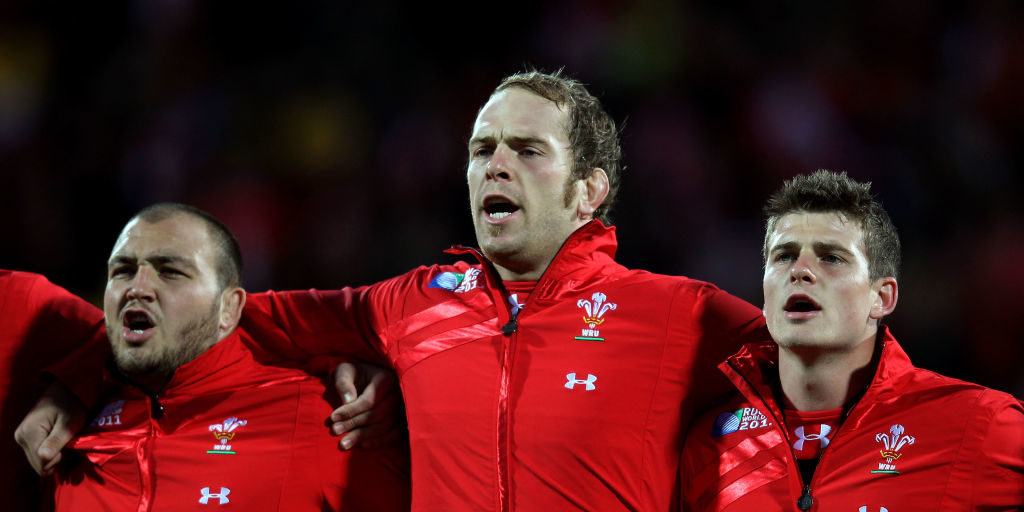After that shambles, AWJ must surely start

NEW PLYMOUTH, NEW ZEALAND - SEPTEMBER 26: (L-R) Craig Mitchell, Alun Wyn Jones and Scott Williams of Wales sing the national anthem prior to kickoff during the IRB 2011 Rugby World Cup Pool D match between Wales and Namibia at Stadium Taranaki on September 26, 2011 in New Plymouth, New Zealand. (Photo by Alex Livesey/Getty Images)
By making an almighty mess of Wales, Georgia have given the world’s most capped a new lease of life. Alun Wyn Jones will surely be back on Saturday.
Had they taken care of business on Saturday, Wayne Pivac would have had reason for daring to think about the hitherto unthinkable – dropping Jones to give more time to the next generation of locks.
Doing so against Australia in Cardiff on Saturday would have been anathema for the last 10 years or more. Even now, with the world’s most-capped player in the twilight of a career like no other, the notion of leaving him out sounds almost sacrilegious.
Pivac and his coaches know all about Jones, more than enough to acknowledge that if their World Cup was kicking off this weekend instead of the one in Qatar the evergreen Osprey would be preparing for one last global hurrah.
What they need to find out as a matter of some urgency is a whole lot more about the brightest and best of the young second row brigade. Ben Carter, the 21-year-old Dragon, started against Georgia yesterday, Dafydd Jenkins making his debut off the bench at 19.
Exeter, a club admired by many in Wales for the way they nourish young players, think so highly of the teenager from Porthcawl that they made him captain for last week’s Premiership match against London Irish. Even making full allowance for a raft of absentees on Test duty, that amounted to a striking acknowledgement of Jenkins’ leadership.
Wales promptly summoned him to their camp after Will Rowlands had been ruled out until the New Year. His starting place alongside Adam Beard against the wobbling Wallabies has to be filled by one of the new boys, Carter or Jenkins.
If Wales discover that they have at least one new lock demanding to be chosen for the World Cup, they will have won something more valuable than the match itself. Picking Jones would leave one of the new boys kicking his heels on the bench and the other reduced to the role of a paid spectator.
The Georgians have shot that argument to smithereens. Recalling Jones may be as short-term as it gets but with questions being asked about Pivac, Stephen Jones, Jonathan Humphreys and Gethin Jenkins, the coaching hierarchy dare not look beyond the next game.
Alun Wyn knows a bit about being on the receiving end of embarrassing home defeats. His one start for Wales in the last 12 months, inexplicably promoted at Rowlands’ expense, coincided with the losing Six Nations finale against Italy in Cardiff. Since then he has covered the position on the bench as the best of the rest. Whether he remains so throughout the Six Nations and on to France next autumn depends entirely on what strides Carter and Jenkins make between now and then.
The second row stocks would have been thinner still had Rowlands, born and bred in the English game, not declared for the Land of His Father and upped sticks from Wasps to Newport, a smart move if ever there was given his previous club’s implosion.
Jones would surely appreciate the need for Wales to give tomorrow’s men a due shot to show that their time will come between now and the World Cup. He would also appreciate that time is the most remorseless of old foes and that at 37 there isn’t much of it left at the highest level.
There again he could always cite Johnny Sexton as an example of a 37-year-old still at the top of his craft. There is a notable difference between them: Ireland’s entire game revolves around Sexton while in Wales, the ex-captain is currently part of the supporting cast.
Nobody would bet against Jones lasting long enough to ensure a fifth World Cup. He would want to be there on merit as opposed by default. Should Carter and or Jenkins rise to the challenge, then Jones will have a fight on his hands. Right now, Wales are in such a state that they cannot afford to look beyond this weekend and the danger of ending the year in a serious condition.